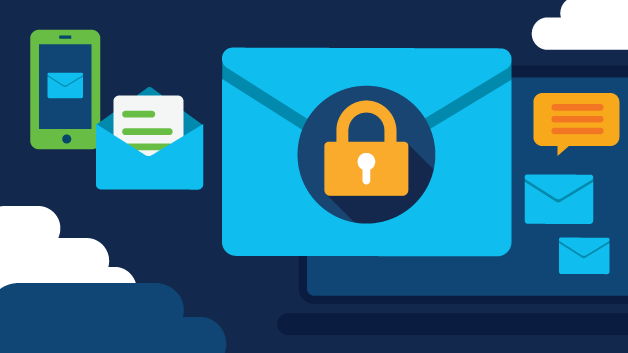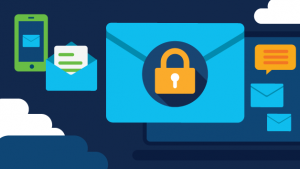7-Step Guide For Best Business Email Security
Updated on March 1, 2024, by Xcitium

The embrace of digitalization has brought some of the greatest tech inventions. Hence, we can’t escape from the fact that the facilities of an open digital lifestyle followed by our professionals and personal daily activities have also made us close to cyberspace threats.
Inbound attacks not only steal the data and hijack the networks but also cause the loss of millions to billions of dollars. The general example of email phishing attacks that have become the worst nightmares of cybersecurity leaders is enough to express the lethal violating acts of cyber criminals.
Companies and corporate professionals can have the wrong perception of cyber-attacks through phishing attacks. However, according to current incidents, honeypot traps are the reasoning threats for data theft and ransom demands.
Corporate enterprises and employees have to work on their business email security, as all the recently researched stats are for the awareness about cyber threats specially designed to exploit endpoint devices and digital presence.

What Is Business Email Security?
The world of cybersecurity services is not as complex as many of us believe it to be. Just like we take the expert consultancy of IT professionals regarding our IoT-related issues. Similarly, companies and professional employees take the needed help from cybersecurity’s expert engineers for every facing challenge.
So, the services offering of business email security work in the same way like safeguarding companies, networks, endpoint devices, and cloud storage. As the occurrence of dangerous cyber-attacks has increased through the years, almost every email and system can get exploited. So, users and employees have to be alert plus extra ready for their business email security.
In other words, business email safeguarding is a much-needed practice to keep your professional email secure that can be exploited resulting in system hijacks and data theft. After the birth of AI cybercriminals have become smarter than ever, and that is causing nightmares to cybersecurity leaders. Therefore, in today’s time when our digital protectors are facing trouble, we as commoners must take a stand and start building powerful protecting cyber walls for unbreakable business email security.
What Are Some Of The Common Business Email Security Threats?
Before landing on our top tips for keeping your business email secure, there are several common threats we should discuss about. Business companies can’t ignore the blasts of inbound attacks as all organizations including enterprises, startups, and government sectors are the targets of anonymous hackers and cybercriminals.
Let’s clear our minds that it is not just a simple email that gets harmed after a successful malware blast. Cyber traps on emails work as a gate pass entry to execute the most destructive and horrifying violations.
On account of this, here is the list of foremost occurring business email security threats that are most commonly faced by companies.
Phishing Traps
Among the most inbound attacks, phishing traps are more regular and dangerous than all in the context of business email security. This type of trick is used to excite the user by creating urgency. Basically, fraudulent emails including malware are generated by cybercriminals and blasted to their target professionals.
There are plenty of ways to excite and warn the targets to visit the suggested website or share classified information along with bank account keys and personal account credentials. The basic phishing trap practice manipulates the professionals by representing a financial bank or some renowned brand asking for passwords and personal info for required operations or jackpot prize gains.
Malware Payloads
The malware is the superlative form of other common inbound attacks. All the lethal attacks such as viruses, worms, trojans, spyware, and ransomware are basically malware payloads. In emails, they are attached along with links of downloading any software or visiting the spammy website.
The malware payloads enter the system and hide without user notice. First, they exploit business emails and then start allowing unauthorized entries. In current times, cybercrime as a service marketplace has expanded beyond our expectations. As many hackers just find their soft targets, exploit their emails, and then allow other cybercriminals to take advantage of everything open to them.
Email Spoofing
Hackers are smart engineers who use their skills to violate acts. We can get an idea about their criminal actions from that; they carefully observe the activities of soft targets and use their daily exploration activities against them. Email spoofing is something when a cybercriminal gathers the required data of professionals and replicates their emails and accounts to scam others linking people.
First, they gather their needed data about individuals and companies, then they fraud others by being trusted links. This practice may result in asking for financial support, requesting personal info, or charging ransomware. In several cases, employees are encountered not spoofing emails but websites, addressing themselves as the trusted hub of governmental agencies.
BEC (Business Email Compromise) Fraud
Let’s learn about another fraud like spoofing, BEC (Business Email Compromise) attack. In spoofing, attackers replicate the emails and websites of others to execute their data theft and ransomware plans. Although in BEC fraud, they hack into the business emails of others and sit in the front seat.
In simple, cybercriminals don’t create new emails, they just find the vulnerability and exploit the email by scamming related professionals linked with their target personality. The society of anonymous hackers is cruel as hell on the dark web and this fraud is just a simple yet destructive element of their illicit cyber operations.
Email Bombing
The threat of email bonding cautions users to not visit websites with unknown sources. This type of cyber-attack makes users their target for faulty email blasts. Just like downloading an application or accepting cookies of unknown websites, users are banged with scammy cold ads. In the same way, email bombing targets the mailboxes of professional individuals.
Every cyber-attack is not simple enough and can cause trouble to users. Likewise, there can be many intentions for email bombing, as users face challenges while locating their needed email from work or professional links.
Botnet Massages
The technique of disturbing the daily activities of company employees doesn’t end with spoofing, BEC, and email bombing attacks, as botnet messages connected with faulty networks are another cruel malicious cyber operation.
In the unwanted operation, a computer system is targeted connecting with other defective computing systems making a network of botnet messages. The aim is to explode botnet-generated emails in users’ business mailboxes.
Ransomware Threats
There can’t be any threatening digital experience than companies facing payment demands in the form of cyber ransomware attacks. This disturbing threat is also a common attack implemented by anonymous hackers, demanding payment by stealing the data and hijacking networks plus endpoint devices.
One of the most executed lethal practices by cybercriminals starts through email exploits. In this vicious process, malware and data-stealing viruses are attached to spamming emails that allow access of emails to attackers for cyber violations.
Zero-Day Exploits
Ever heard about email vulnerabilities? The exercise of zero-day exploits works in that way but is way more sabotage than a common vulnerability exploit.
In simple, taking advantage of vulnerability is at the core of cyber attackers. However, zero-day attacks are way damaging. By this act, cyber-attackers exploit weak points that are not in the knowledge of users. Just like that, zero-day exploits destroy the whole network of companies by entering the systems through a simple daily business email.
7 Key Guidelines To Keep Your Business Email Fortified
Where do we turn our heads when an expert guide is required? It is obvious that we call experienced personalities who assist during rush scenarios. However, in the case of email security, most of the cybersecurity leaders aren’t confident about today’s utilized techniques for prevention. Secondly, the use of AI is a wider factor for all the stresses today’s cybersecurity professionals face while offering real-time protection.
To be honest, any technical blogs or tutorial videos about cybersecurity can’t offer full-time solutions to their audience. And it is always helpful for enterprises and startups to ask for help from the best people in this business. Although we must come up with our own alternatives for the safety of our data and online presence.
So, here are some of the most followed practices by global professionals who have successfully secured their business emails. Check them out here.
Don’t Just Click On Every Spamming Email
Yes! We get it. It is not easy to ignore every coming email; thus, being careful is the only thing we do at that moment. Hence, attentive companies don’t allow these kinds of emails to enter into the mailboxes. They simply follow their backup plan of an email filtering system employed from a trusted cybersecurity platform.
Otherwise, for instant action, users can observe the received email and gather the data of the sender. And if individuals have opened the email, they should not click on any shared link nor download any attached file.
Employ A Security Tool For Protection From Malware
In case of security breaches happening due to email exploits, your computer system should be ready with a strong data security and threat prevention plan. There are many tools and software available for all-day active security shields for companies and individual professionals.
In most cases, modern technologies such as EDR (Endpoint Detection and Response) and UltraAV are employed for endpoint protection. Plus, managed IT security services are also hired from MSSP and SOCs. But users are advised to take consultancy from a proven team of cybersecurity engineers regarding safeguarding from inbound malware attacks.
Be Aware Of Honeypot Traps
There should be extra care and awareness about modern cybersecurity threats that are located in the form of honeypot traps. Every email including exciting words for stimulation can be an act of fraud. Similarly, phishing traps also come in the form of special requests for social causes.
Business companies must conduct cybersecurity awareness programs to guide their employees regarding the needed precautions and protective guards. Additionally, they are also advised to be more protective in offering defense to their employees’ business emails.
Avoid Using Business Email For Personal Use
We can come up with so many excuses and may neglect the facts. But the majority of employees use business emails for visiting unknown websites and downloading unspecified software.
The use of professional email for personal digital exploration can be unintentional; thus, professionals have to be alarmed about every possible threat and must avoid following this unethical practice.
Create Complex & Strong Password
The suggestion of creating complex and strong passwords has become universal because they are the ones that can be easily cracked by cyber attackers. The one simple guide is to use uppercase and lowercase letters along with symbols and numbers.
Furthermore, there are quite a few techniques you can try. For instance, create long passwords or you can change them on a daily or weekly basis. Plus, as extra protection, don’t select one specific password for multiple emails and accounts.
Take Internal Threat Seriously
We as corporate employees only blame digital pirates for every data leak and system hack. But in reality, sometimes it’s internal threats that lead to malware payloads, data wipes, and system hacks. In that case, employees must be watchful for their endpoint devices.
Time to not talk about personal and business email credentials publicly, and don’t leave your system open if you are not actively working. Just shut down your system and log out of your email before switching off from work.
Avail Xcitium Secure Email Gateway Solutions
When every door of help concerning cyber threat protection gets closed, only the guardian angels arrive for help. Xcitium’s team is ready to offer full-time secure email gateway solutions to companies for rapid threat identification and response. Here is what our pack of XSEG’s features and benefits include;
- Complete Antispam protection for incoming mails
- Complete Antispam protection for outgoing mails
- Easy to use and configure
- Easy to manage quarantine
- Easy to manage recipient whitelist
- Easy to manage sender blacklist



 (3 votes, average: 3.67 out of 5, rated)
(3 votes, average: 3.67 out of 5, rated)










